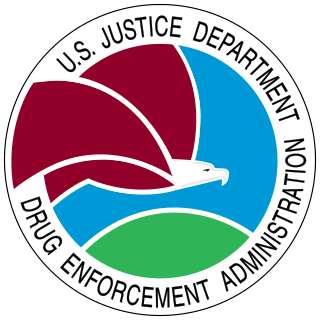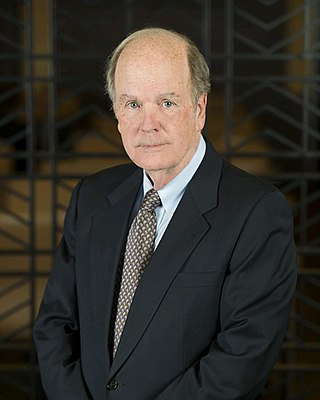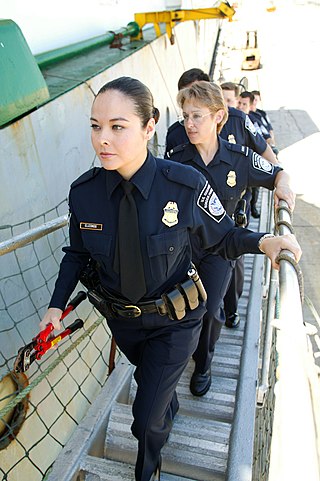
The United States Department of Homeland Security (DHS) is the U.S. federal executive department responsible for public security, roughly comparable to the interior or home ministries of other countries. Its stated missions involve anti-terrorism, border security, immigration and customs, cyber security, and disaster prevention and management.

The Drug Enforcement Administration (DEA) is a United States federal law enforcement agency under the U.S. Department of Justice tasked with combating illicit drug trafficking and distribution within the U.S. It is the lead agency for domestic enforcement of the Controlled Substances Act, sharing concurrent jurisdiction with the Federal Bureau of Investigation, the U.S. Immigration and Customs Enforcement, and U.S. Customs and Border Protection. However, the DEA has sole responsibility for coordinating and pursuing U.S. drug investigations both domestically and internationally.

The United States secretary of homeland security is the head of the United States Department of Homeland Security, the federal department tasked with ensuring public safety in the United States. The secretary is a member of the Cabinet of the United States. The position was created by the Homeland Security Act following the attacks of September 11, 2001.
U.S. Immigration and Customs Enforcement is a federal law enforcement agency under the U.S. Department of Homeland Security. ICE's stated mission is to protect the United States from cross-border crime and undocumented immigration that threaten national security and public safety.

The United States Border Patrol (USBP) is a federal law enforcement agency under the United States Customs and Border Protection (CBP) and is responsible for securing the borders of the United States. According to its web site in 2022, its mission is to "Protect the American people, safeguard our borders, and enhance the nation’s economic prosperity."

United States Customs and Border Protection (CBP) is the largest federal law enforcement agency of the United States Department of Homeland Security. It is the country's primary border control organization, charged with regulating and facilitating international trade, collecting import duties, as well as enforcing U.S. regulations, including trade, customs and immigration. CBP is one of the largest law enforcement agencies in the United States. It has a workforce of more than 45,600 federal agents and officers. It is headquartered in Washington, D.C.

Robert Cleve Bonner is an American lawyer and arbitration neutral, a former prosecutor, former United States District Judge, former Administrator of the Drug Enforcement Administration and former Commissioner of United States Customs and Border Protection. He is a member of the Board of Trustees of the California Institute of Technology, a retired partner at the law firm Gibson, Dunn & Crutcher and former Chair of the California Commission on Judicial Performance.

The Federal Law Enforcement Training Centers serves as an interagency law enforcement training body for 105 United States government federal law enforcement agencies. The stated mission of FLETC is to "...train those who protect our homeland". Through the Rural Policing Institute (RPI) and the Office of State and Local Training, it provides tuition-free and low-cost training to state, local, campus and tribal law enforcement agencies.

The Mexico–United States border is an international border separating Mexico and the United States, extending from the Pacific Ocean in the west to the Gulf of Mexico in the east. It traverses a variety of terrains, ranging from urban areas to deserts. The Mexico–U.S. border is the most frequently crossed border in the world with approximately 350 million documented crossings annually. Illegal crossing of the border to enter the United States has caused the Mexico–United States border crisis. It is one of two international borders that the United States has, the other being the northern Canada–United States border; Mexico has two other borders: with Belize and with Guatemala. The Mexico-U.S. border is the tenth-longest border between two countries in the world.

The United States Central Intelligence Agency (CIA) has been accused of involvement in the trafficking of illicit drugs. Books and journalistic investigations on the subject that have received general notice include works by the historian Alfred McCoy, professor and diplomat Peter Dale Scott, journalists Gary Webb and Alexander Cockburn, and writer Larry Collins. These claims have led to investigations by the United States government, including hearings and reports by the United States House of Representatives, Senate, Department of Justice, and the CIA's Inspector General. The various investigations have generally not led to clear conclusions that the CIA itself has directly conducted drug trafficking operations, although there may have been instances of indirect complicity in the activities of others.

The Mexican drug war is an ongoing asymmetric armed conflict between the Mexican government and various drug trafficking syndicates. When the Mexican military intervened in 2006, the government's main objective was to reduce drug-related violence. The Mexican government has asserted that their primary focus is dismantling the cartels and preventing drug trafficking. The conflict has been described as the Mexican theater of the global war on drugs, as led by the United States federal government.

The Secure Electronic Network for Travelers Rapid Inspection (SENTRI) provides expedited U.S. Customs and Border Protection (CBP) processing, at the U.S.-Mexico border, of pre-approved travelers considered low-risk. Voluntarily applicants must undergo a thorough background check against criminal, customs, immigration, law enforcement, and terrorist databases; a 10-fingerprint law enforcement check; and a personal interview with a CBP Officer. The total enrollment fee is $122.50, and SENTRI status is valid for 5 years.

The federal government of the United States empowers a wide range of federal law enforcement agencies to maintain law and public order related to matters affecting the country as a whole.

Juan José Esparragoza Moreno, commonly referred to by his alias El Azul, was a Mexican drug lord and member of the Sinaloa Cartel, Guadalajara Cartel and Juárez Cartel, three large and powerful criminal organizations. Originally a member of the Dirección Federal de Seguridad (DFS) police agency, he founded the Guadalajara Cartel in the 1970s along with other drug kingpins in Mexico. Following its disintegration in the late 1980s, he went on to lead the Juárez Cartel and eventually settled in the Sinaloa Cartel. He worked alongside Joaquín "El Chapo" Guzmán and Ismael Zambada García, once considered world's most-wanted, powerful and rich drug lords.

The Sinaloa Cartel, also known as the Guzmán-Zambada Organization, the Federation, the Blood Alliance, or the Pacific Cartel, is a large, international organized crime syndicate based in the city of Culiacán, Sinaloa, Mexico that specializes in illegal drug trafficking and money laundering.

The Bridge of the Americas (BOTA) is a group of international bridges which cross the Rio Grande and Texas State Highway Loop 375, connecting the Mexico–United States border cities of Ciudad Juárez, Chihuahua, and El Paso, Texas, via the MX 45 from the south and the I-110 from the north, crossing the El Paso BOTA Port of Entry. The bridge is known colloquially as "Puente Libre" in Ciudad Juárez, officially as "Puente Internacional Córdova-Las Américas" or "Puente Internacional Córdova de las Américas", and also as "Puente Río Bravo", "Cordova Bridge", and "Free Bridge".
Project Gunrunner is a project of the U.S. Bureau of Alcohol, Tobacco, Firearms and Explosives (ATF) intended to stem the flow of firearms into Mexico, in an attempt to deprive the Mexican drug cartels of weapons.

La Familia Michoacana, La Familia, is a Mexican drug cartel and organized crime syndicate based in the Mexican state of Michoacán. They are known to produce large amounts of methamphetamine in clandestine laboratories in Michoacan. Formerly allied to the Gulf Cartel—as part of Los Zetas—it split off in 2006. The cartel was founded by Carlos Rosales Mendoza, a close associate of Osiel Cárdenas. The second leader, Nazario Moreno González, known as El Más Loco, preached his organization's divine right to eliminate enemies. He carried a "bible" of his own sayings and insisted that his army of traffickers and hitmen avoid using the narcotics they produce and sell. Nazario Moreno's partners were José de Jesús Méndez Vargas, Servando Gómez Martínez and Enrique Plancarte Solís, each of whom has a bounty of $2 million for his capture, and were contesting the control of the organization.

The Foreign Narcotics Kingpin Designation Act, better known as the Kingpin Act, is landmark federal legislation in the United States intended to address international narcotics trafficking by imposing United States sanctions on foreign persons and entities involved in the drug trade.

Operation Kruz Control was a twelve-month, multi-agency investigation of a drug trafficking organization in southern Arizona, between December 2012 and December 2013.

















